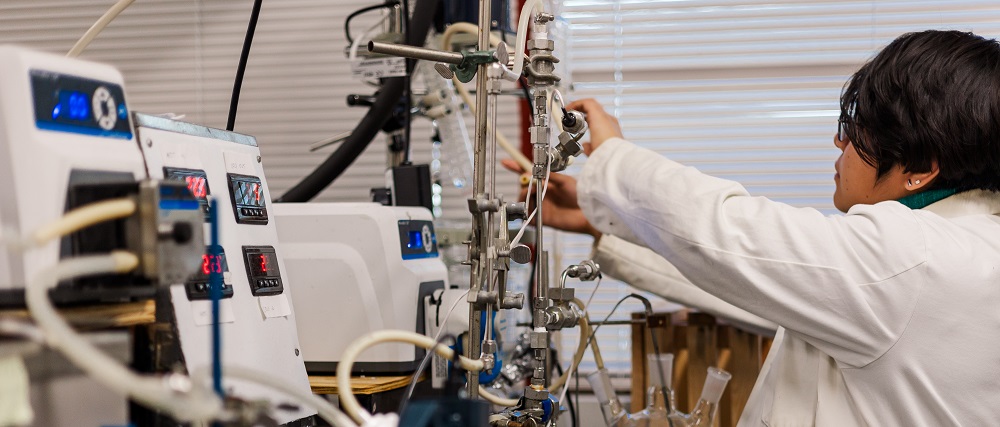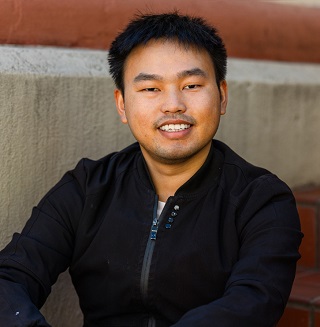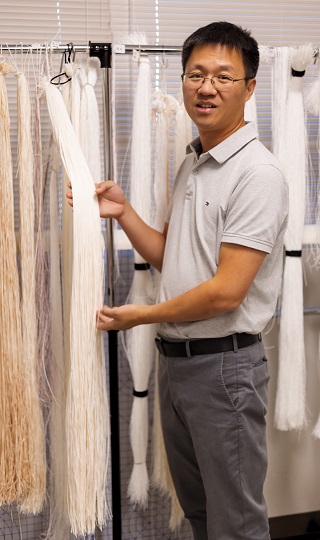
Dr. Jianjia Yu
Donate Now
Polymer Filter Formulations Clean Produced Water in Two of New Mexico's Largest Industries
2.4 billion gallons of produced water, a naturally-occuring byproduct of oil and gas production, are created every day in the United States, 160 million gallons in New Mexico alone. Fresh water shortage and produced water reuse have always been hot topics in New Mexico and as the climate changes, experts from across the state and around the world are putting their heads together for real solutions.
Dr. Jianjia Yu, NMT alum (Ph.D. Petroleum Engineering, 2012), Chemical Engineering faculty member and head of the Petroleum Recovery Research Center’s (PRRC) Produced Water group, has a patent pending for specific formulations of hollow fiber membranes for particular use in membrane distillation to remediate high-salinity produced water.
Membrane distillation has been around since about 1960, however, the lack of commercially available membranes still limits the technol-ogy for large-scale industrial applications. Dr. Yu’s team is the first to develop innovative membranes that can be customized depending on the specific demands of membrane distillation. His team does this through creating special formulations of the polymeric membrane itself, all of which are made in house at NMT.
These unique hollow fiber membrane-based modules have been validated in pilot scale testing on produced water from the oil industry in Roswell, NM (cleaning 1,260 gallons per day) and from a local dairy in Clovis, NM (cleaning 20,000 gallons/day). Currently, the processes are able to recover 50% of the produced water with an initial total dissolved solids (TDS) of 155,000 mg/L.
This technology helps industry reduce costs associated with produced water disposal and provides an alternative, usable water source - after treatment the water meets all of the EPA standards, even for drinking water.
Zongjie He, Ph.D. student, Materials Engineering
 Dr. Yu's team has also developed innovative hollow fiber membranes for carbon dioxide
capture. Zongjie He, a current Ph.D. student, is researching highly efficient and
scalable membrane processes for carbon dioxide removal directly from the air, which
is also called direct air capture (DAC). The experiences learned from produced water
treatment will accelerate the scaling-up process of the DAC technology in terms of
hollow fiber membrane manufacturing and membrane module assembly. This work is expected to reduce the amount of carbon dioxide in the atmosphere, thereby
slowing down the effects of global warming, which is one of the key technologies to
combat global climate change.
Dr. Yu's team has also developed innovative hollow fiber membranes for carbon dioxide
capture. Zongjie He, a current Ph.D. student, is researching highly efficient and
scalable membrane processes for carbon dioxide removal directly from the air, which
is also called direct air capture (DAC). The experiences learned from produced water
treatment will accelerate the scaling-up process of the DAC technology in terms of
hollow fiber membrane manufacturing and membrane module assembly. This work is expected to reduce the amount of carbon dioxide in the atmosphere, thereby
slowing down the effects of global warming, which is one of the key technologies to
combat global climate change.
